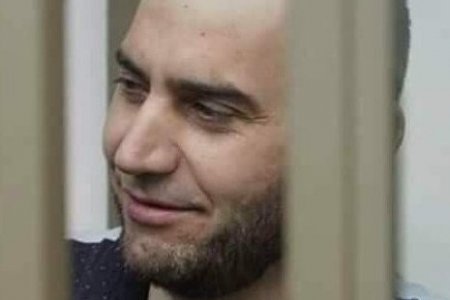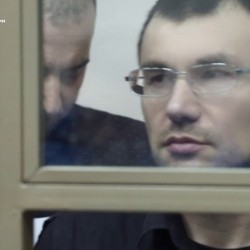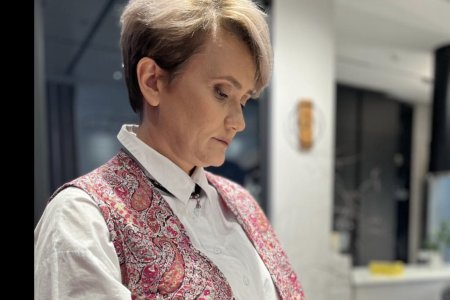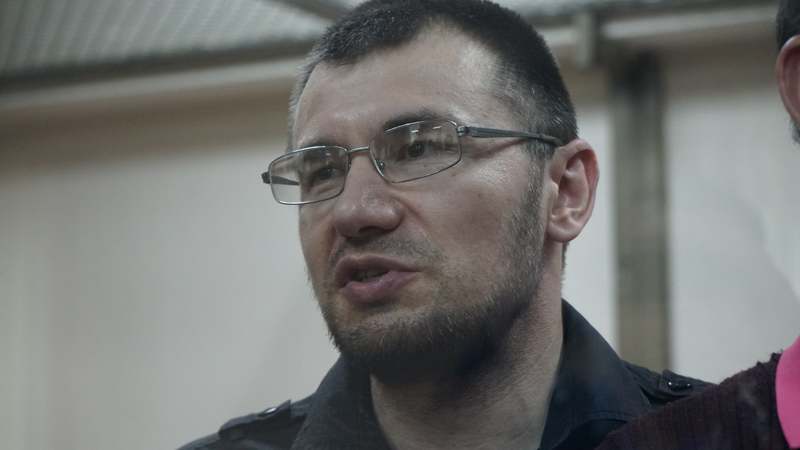
Emir-Usein Kuku is receiving no medical care in a Russian prison colony despite a growth on his knee causing immense pain and making ti difficult to move about. The Crimean Tatar human rights defender, political prisoner and Amnesty International prisoner of conscience has, at most, received antibiotics which, as his wife, Meriem says, can hardly be called treatment.
Meriem Kuku explained to Crimean Solidarity that the only examination that her husband received was while he was still held in SIZO, or remand prison, in Rostov-on-Don several years ago. At that stage, he underwent an ultrasound examination, with the diagnosis then given being that the growth was a Baker’s (or popliteal) cyst – a type of fluid collection behind the knee. There was no treatment, nor has there been any further examination, despite the cyst, if that it is, having increased in size, and despite the pain he is experiencing, and the fact that he is sometimes unable to even stand up.
Kuku, who is 49, also has other issues, including chest, lower back and kidney pain. Nine years in the appalling conditions of Russian penal institutions will inevitably be taking its toll. The kidney problems are also likely to have been caused by the torture to which he was subjected in 2015 after an apparent abduction attempt had to be aborted and turned into an ‘FSB ‘search and interrogation’. In June 2023, he was urgently hospitalized, with his family told nothing. It was only after Meriem contacted the public monitoring group for Bashkortostan (Bashkiria), that the head of the monitoring group was able to contact the prison and learned that Kuku had been hospitalized in acute pain at around 5 a.m. on 21 June, no more.
It is now known that he underwent an operation in July 2023 at the prison hospital in Ufa, with intestinal adhesions removed. No information was provided as to why or from which part of the intestines the adhesions were removed.
Kuku recently suffered from a severe bout of tonsilitis, with a high temperature and bad cough. It took the ‘medical staff’ of the prison colony four days to react “because of public holidays”.
Kuku, it should be said, is not alone in being denied fundamental and timely medical care, with a number of Crimean Tatar and other Ukrainian political prisoners also facing this same form of effective medical torture. All are regularly placed in the so-called SHIZO, or punishment cells, where the conditions are especially appalling. Any pretext is used, or simply fabricated, for such ‘punishment’.
Emir-Usein Kuku (b. 26 June 1976) is the son of a veteran of the Crimean Tatar national movement. He responded to the ever-mounting number of enforced disappearances, armed searches and politically motivated arrests that Russia had brought with its invasion and annexation of Crimea and joined the Crimean Contact Group for Human Rights. He was specifically responsible for monitoring human rights violations in the Yalta region.
Kuku was the first of a long, and unfortunately, mounting list of Crimean Tatar and other Ukrainian human rights activists sentenced on preposterous charges to huge terms of imprisonment. His case does, however, stand out in that there are strong grounds for suspecting that he came very close to being the latest victim of Russia’s enforced disappearances in occupied Crimea. It would be hard to find another explanation for the events of 20 April 2015 when the attack on him by two men and likely planned abduction failed, after Kuku’s cries were heard, and turned, just minutes later into an FSB ‘search of his home’ and ‘interrogation’ by beating. (see When Abduction Turns to FSB ’Search’ in Russian-occupied Crimea ).
Neither then, nor on 3 December 2015, when charges against him were announced under Russia’s notorious ‘extremism’ legislation over Facebook posts, was there any suggestion of the charges later used to sentence him to 12 years.
It had been clear since April 2015 that Kuku was being targeted because of his human rights activism, and it is no accident that it was the especially brutal and gratuitously violent arrests on 11 February 2016 of Emir-Usein Kuku; Muslim Aliev; Inver Bekirov and Vadym Siruk, as well, soon afterwards, as two much younger men – Refat Alimov and Arsen Dzhepparov, that led to the emergence of the Crimean Solidarity human rights movement. As well as ensuring coverage of repression, Crimean Solidarity and the related organization Crimean Childhood have provided support for the families of political prisoners, including children like Bekir and Safiye Kuku, who were profoundly traumatized by the violent attack on 11 February 2016.
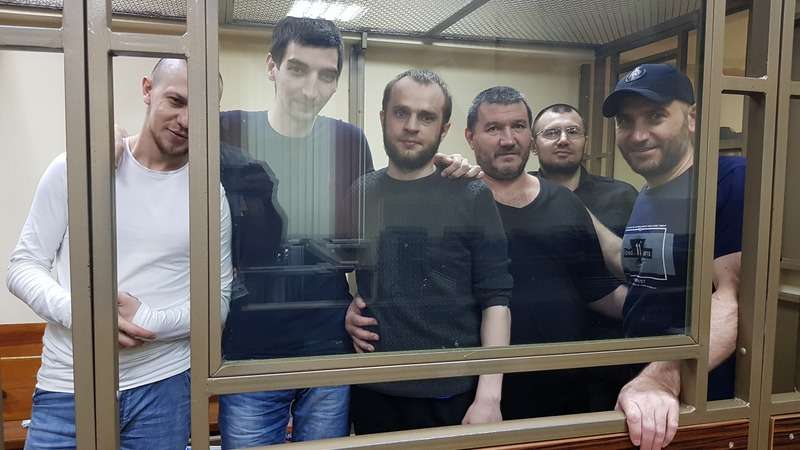
Kuku was the first of very many Crimean Tatar civic activists or journalists to face spurious ‘terrorism’ charges, based solely on claims of involvement in Hizb ut-Tahrir. This peaceful, transnational Muslim organization is legal in Ukraine and most other countries, and Russia’s 2003 supreme court ruling declaring Hizb ut-Tahrir was passed in suspicious secrecy. The use of this ruling as justification for supposed ‘terrorism trials’ is particularly lawless given the adoption in 2006 of Russia’s law on countering terrorism, which clearly sets out criteria for defining terrorism, a terrorist act or organization.
Two of the men: Muslim Aliev and Inver Bekirov were designated the role of ‘organizer’ of an entirely unproven Hizb ut-Tahrir ‘cell’, under Article 205.5 § 1 of Russia’s criminal code. The other four men were accused of ‘involvement in this ‘cell’ under Article 205.5 § 2. Later, all six men were also charged, without any grounds other than questionable interpretations of Hizb ut-Tahrir ideology, with ‘‘planning to violently seize power’ under Article 278.
The ‘trial’ was profoundly flawed, with the only ‘evidence’ coming from fake FSB-loyal ‘experts’ and anonymous witnesses. This, however, was a political trial, with ‘judges’ Roman Viktorovich Saprunov; Dmitry Viktorovich Merkulov and Roman Vladimirovich Podolsky (from the Southern District Military Court in Rostov providing the six guilty verdicts required of them. These were, on 25 June 2020, upheld by Oleg Aleksandrovich Yegorov; Aleksander Aleksandrovich Mordovin and Anatoly Valentinovich Solin. Despite having committed no crime, Muslim Aliev and Inver Bekirov were sentenced to 19 years; Emir-Usein Kuku and Vadim Siruk to 12 years; Refat Alimov to 8 years and Arsen Dzhepparov to 7 years. All of the sentences were to be served in the harshest of Russian prison colonies, with the men held thousands of kilometres from their families in Crimea.
All six men were recognized by the Memorial Human Rights Centre as political prisoners and by Amnesty International as prisoners of conscience. Their release has been constantly demanded by international bodies and democratic states, yet only Arsen Dzhepparov and Refat Alimov are now free, having been forced to serve their sentences to the last day.
Please also write to Emir-Usein Kuku; Muslim Aliev; Inver Bekirov and Vadym Siruk!
Letters are a lifeline to the men and send an important message to Moscow that its treatment of Ukrainian political prisoners is under scrutiny. Letters need to be in Russian, handwritten, and on ‘safe’ subjects. If that is a problem, use the sample letter below (copying it by hand), perhaps adding a picture or photo. Do add a return address so that the men can answer.
Sample letter
Привет,
Желаю Вам крепкого здоровья и надеюсь, Вы скоро вернетесь домой, к своим родным. Простите, что мало пишу – мне трудно писать по-русски, но мы все о Вас помним.
[Hi. I wish you good health and hope that you will soon be home, with your family. I’m sorry that this letter is short – it’s hard for me to write in Russian., but you are not forgotten. ]
Addresses (these can be in English or Russian, as below)
Emir-Usein Kuku
453256, Россия, Республика Башкортостан, г. Салават, ФКУ ИК-16
Куку, Эмиру-Усеину Кемаловичу, 1976 г.р.
[In English: Russian Federation, 453256, Bashkortostan, Salavat, Prison No. 16
Kuku, Emir-Usein Kemalovich, b. 1976 ]
Muslim Aliev
453256, Россия, Республика Башкортостан, г. Салават, станция Южный, ФКУ ИК-2
Алиеву, Муслиму Нуриевичу, 1971 г.р.
[In English: Russian Federation, 453256, Bashkortostan, Salavat, Stantsiya Yuzhny, Prison No. 2
Aliev, Muslim Nurievich, b. 1971 ]
Inver Bekirov
453256, Россия, Республика Башкортостан, г. Салават, станция Южный, ФКУ ИК-2
Бекирову, Инверу Небиевичу, 1963 г.р
[In English: Russian Federation, 453256, Bashkortostan, Salavat, Stantsiya Yuzhny, Prison No. 2
Bekirov, Inver Nebiyevich, b. 1963 ]
Emir-Usein Kuku
453256, Россия, Республика Башкортостан, г. Салават, ФКУ ИК-16
Куку, Эмиру-Усеину Кемаловичу, 1976 г.р.
[In English: Russian Federation, 453256, Bashkortostan, Salavat, Prison No. 16
Kuku, Emir-Usein Kemalovich, b. 1976 ]
Vadym Siruk
453256, Россия, Республика Башкортостан, г. Салават, станция Южный, ФКУ ИК-2
Сируку, Вадиму Андреевичу, 1989 г.р.
[In English: Russian Federation, 453256, Bashkortostan, Salavat, Stantsiya Yuzhny, Prison No. 2
Siruk, Vadim Andreevich, b. 1989 ]

